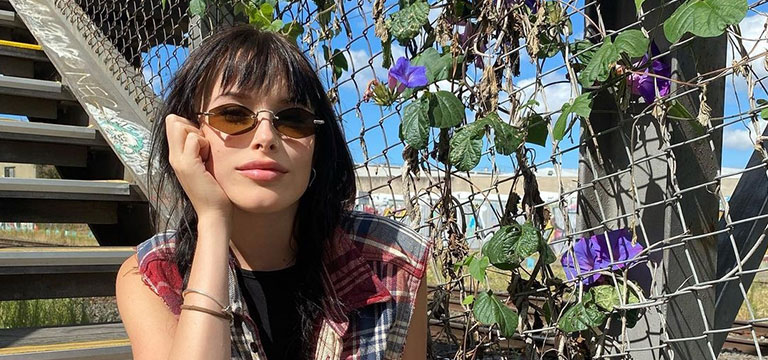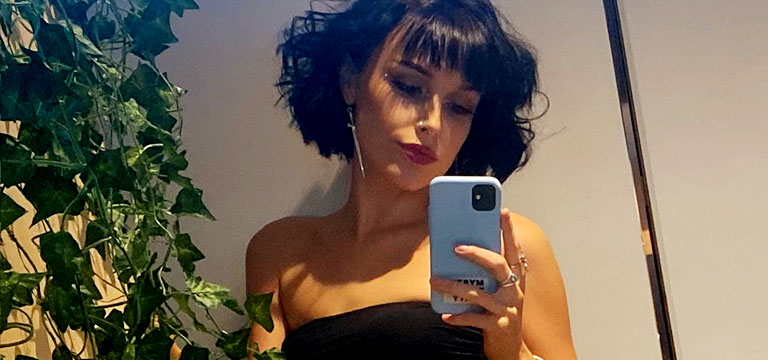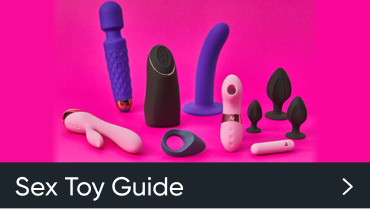Free Shipping over $69
Discreet and fast delivery
Free gift over $75+
Rewards program
Best price guarantee
My Intersex Journey

My life experience has always been a little bit different from the ‘norm’. Growing up I recall feeling butterflies in my stomach from being close to pretty girls. My learning style was not like others in my class; I needed more help with most things, yet I seemed to excel in ways that they did not. While my peers found excitement in what I considered to be mundane, I was drawn to the magic and wonder of fantasy. And as I was growing into my own as a teenager, I faced yet another unexpected difference: I found out that I was born Intersex, meaning I was born with attributes of both male and female.
The invisible identity
Before my journey began, I’d never heard of intersex. And I could never have imagined that it would become such a defining part of my life.
I first noticed something was off in my early teenage years. Puberty wasn’t really happening to me like it was to my friends. I wasn’t growing any pubes or underarm hair, I wasn’t getting any pimples, and I wasn’t growing breasts. But I also wasn’t overly concerned. I just thought I was a late bloomer and that everything would sort itself out eventually!
Then I noticed two lumps forming on my lower abdomen and I panicked! I was convinced I was dying, and my parents were just as freaked out as I was. We rushed to see a paediatric specialist, hoping for some answers. At first it seemed simple. The doctor assured us that the lumps were just hernias and could be easily fixed. Then I mentioned that I still hadn’t gone through puberty.
“Just to let you know,” I said naively. Then she started asking me more questions, and I found myself undergoing a series of tests and examinations.
I have to tell you something…
She said. My stomach dropped and my pulse quickened. My eyes darted nervously between the doctor and my parents, their eyes brimming with tears. I’d been convinced nothing ‘bad’ could happen to me. Maybe hernia surgery.
“Does this have something to do with me not having my period?”
The doctor’s face contorted with a mix of fear and pity, and my world started to blur. I felt like a volcano ready to erupt. At this moment, the foreign notion of “Intersex” barely registered. Instead, I was fixated on one thing: “You’ll never have children of your own.” It was a cruel theft, and I was left grappling with a profound sense of loss. But it wasn’t just my dream of motherhood that was stolen – it was also the chance to fit in and be like everyone else. And that was something I longed for at 16.
As I left the doctor’s office, the words Don’t tell anyone, for your own good! flipped my world upside down. I was isolated and terrified. I felt like I was the only one in the world facing into the unknown. And I was supposed to keep this to myself? Why? How? Was there something that wrong with me? Being inside my body all of a sudden felt foreign. Like everything I thought about who I was, and what I wanted for my life was disintegrating before my eyes.
Keeping the secret
Being different was a tough one to swallow, and something. I struggled to accept, let alone embrace. And then there were the rumours.
“Is it true she’s a man?”
I overheard him on the phone. It was my friend’s boyfriend. I’d told our other friend my secret when I couldn’t hold it in anymore. And she’d told everyone. My heart sunk so far down into my stomach, I could’ve thrown up. It was humiliating, and it was clear that the kids at school couldn’t care less about me. The doctors had been right – I shouldn’t have told anyone. I was different now. And even worse, I knew that people – even those I thought were friends – were going to use that to hurt me.
I went looking for a new community online, supported by my mum. We ventured into hidden corners of the internet and found solace in the empathy and encouragement of people with similar stories to mine. Hours melted away as we absorbed it all, taking comfort in the understanding, connection and empathy from virtual strangers. And the more I learned about this world of intersex, the more I felt awed by the beauty and wonder of our human condition. And the more I felt like I had to talk about it.
Becoming an intersex advocate

It started when my Mum flew me over to America for an intersex medical conference. Walking into that room was like stepping into the big warm hug my younger self needed. The air buzzed with anticipation and excitement. Faces of all ages and backgrounds greeted me, each one radiating a shared understanding. It was an indescribable feeling, knowing that these people were my community. And I was theirs.
Amidst it all, one memory stands out like a beacon of happiness: racing across a football field with four newfound friends, the sprinklers cooling our skin as our laughter echoed in the air. In that moment, I felt an overwhelming sense of joy and belonging that had been absent for far too long. Finally, there were people who got me, who understood the unique challenges I faced. It felt like finding ‘my people’, you know?
Since then, my journey has been a whirlwind of incredible experiences. The more I put myself out there, the more remarkable intersex individuals I connect with. Each is a powerful reminder of the strength and resilience within our community. Together, we’re breaking down barriers, and showing the world the beauty of our diverse experiences. There’s still a long way to go, but I’m proud of the progress we’ve made.
But I know the term “intersex” is still completely foreign to most people. And while I used to somewhat enjoy the “ha ha” moment of when someone would say “I’m into sex too” whenever I told them – that got old quickly. But if you’re here, you’re curious, so let’s break down the biology of it all.
So what is intersex?
Intersex is a word used to describe people who are born with bodies that don’t fit typical male or female definitions. These differences can be seen in a person’s chromosomes, hormones, or genitals. An intersex individual might have a mix of both male and female chromosomes or have genitalia that doesn’t fit into the typical definitions of male or female. It’s not the same as being transgender, which is when a person’s gender identity – how they feel inside – doesn’t match the gender they were assigned at birth. Intersex is a physical condition that a person is born with.
One example of many
I have something called Androgen Insensitivity Syndrome (AIS). In simple terms, it’s a condition that affects the way a person’s body develops. People with AIS are born with ‘male’ chromosomes (XY) but their body doesn’t respond to the hormones that make male characteristics (Androgen). It’s like having a blueprint for a boy’s body, but the construction workers (hormones) didn’t want to follow the plan! So even though I have male chromosomes, my body didn’t respond to the signals to make typical male features. Instead, I look more like a girl on the outside.
Depending on the type of AIS a person has, they might have a penis, genitalia that is ambiguous or have a typical looking vagina. But one thing that’s pretty unique is that even though I don’t have the usual female parts like ovaries or a uterus, I do have my very own set of internal testes! Or as I favourably like to call them – my gonads!
It can be a bit hard to fully grasp everything, but if you’re curious to learn more about it, I go into greater detail on my podcast, Interesting & Se-XY. It’s a show where I discuss all sorts of topics that I find fascinating, and intersex is definitely at the top of that list. You’re welcome to give it a listen and join the conversation. You might just learn something new and have a good time while doing it!
How many types of intersex are there?
We aren’t really sure, because the definition of intersex is kind of tricky. We know there are at least 30 medical terms to describe different combinations of intersex traits, but not every intersex variation has its own specific name. And some people might have variations that don’t fit into any of the existing categories. If you’d like to dive into the more common variations, InterACT have a great article you can check out.
How many intersex people are there?
According to the Intersex Human Rights Australia, it’s estimated that around 1.7% of the population is born with intersex traits, which is roughly the same amount of people who are born with Red Hair! It’s widely speculated that being intersex is more common than most people think.
Pinpointing the exact statistics can be challenging due to a myriad of factors at play. One major factor is the definition of intersex itself. The understanding can vary across different medical disciplines, making it harder to establish a universally agreed-upon framework for classification.
There’s also societal factors such as stigma, discrimination, and a lack of awareness. These can contribute to underreporting and misdiagnosis of intersex conditions. Creating barriers that hinder the accurate collection of comprehensive statistical data.
How can I tell if I’m intersex?
For the majority of people who are intersex, their bodies will be the evidence of being intersex. And most of us find out earlier on in life. So if you’re past puberty and haven’t noticed anything unusual, then it’s likely that you are not intersex.
However, it’s certainly not impossible! So if you suspect that you might be intersex or have concerns about your body, I suggest talking to a doctor or healthcare provider who is familiar with intersex conditions. Going to your GP or doing some research online about specialists in your area is the first step. Then once you have found someone reputable, expect a battery of tests. There’ll be blood tests, imaging tests, and physical examinations at least. The results of these will eventually give you the answers!
My intersex life
As I wrap this up, I want to emphasise that I’m not a doctor, or a specialist. But my personal experiences as an intersex individual and the knowledge I have gained from my doctors, and my own research, makes me wish that this was taught in school. We are more than just XY and XX chromosomes, and if everyone knew that growing up maybe I wouldn’t have been so angry, alone and terrified. So I’m working to change it.
Embracing my intersex identity has truly transformed my life. Looking back, I wish I could reassure my past self not to worry so much. I am happier now than I have ever been. And I now love everything that being intersex brings into my life.
If me talking loudly about intersex identities helps any young person avoid the challenges I faced, I’ll know this has all been worth it. Being intersex is a normal part of our diverse biology, and it’s time it became recognised and accepted as that.
I cannot, and do not, speak for all intersex people. But I hope that they’ll join me in sharing our stories and advocating for our rights. Let us work together towards a world where all individuals can live their lives fully and authentically, without fear of judgment or exclusion.











